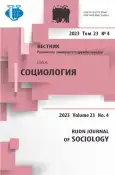Combination of focus group and experiment methods: opportunities and limitations
- Authors: Puzanova Z.V.1, Larina T.I.1, Ignatova T.A.1
-
Affiliations:
- RUDN University
- Issue: Vol 23, No 4 (2023)
- Pages: 866-874
- Section: Sociological lectures
- URL: https://journal-vniispk.ru/2313-2272/article/view/322983
- DOI: https://doi.org/10.22363/2313-2272-2023-23-4-866-874
- EDN: https://elibrary.ru/BSZYCV
- ID: 322983
Cite item
Full Text
Abstract
The use of several sociological techniques can be an effective way to obtain more representative data. The combination of focus group and experiment allows to expand the cognitive capabilities of each method, to better understand complex social phenomena, and to obtain a more complete picture of social objects and processes, and perceptions of them. The advantages and disadvantages of the combination of focus group and experiment were formulated mainly based on the research in which the main indicators were such characteristics as psychotypes, emotional intelligence and suggestibility. The advantage of combining two methods is the in-depth analysis of the phenomenon under study, since focus group provides context and insight into the opinions and experiences of participants, while experiment allows to control the conditions and impact on respondents, test hypotheses and identify cause-and-effect relationships. The combination of methods increases the validity of research practices; however, this combination has several limitations: the timing of focus group can affect the duration of experiment; group dynamics during the focus group can affect the results of experiment and lead to distortions; the presence of a moderator and videotaping of the focus group can affect the behavior of participants and the data. Based on the analysis of several cases, the authors provide recommendations on combining two methods such as: improving the criteria for selecting respondents during recruitment; placing focus group participants taking into account their psychotypes and personality characteristics, and also placing ‘decoy ducks’ according to a certain plan; providing stimulus material in printed form to each focus group participant. Combination of focus group and experiment is a rare research approach; therefore, the main conclusions are based on the authors’ research conducted at the RUDN University.
About the authors
Zh. V. Puzanova
RUDN University
Author for correspondence.
Email: puzanova-zhv@rudn.ru
доктор социологических наук, профессор кафедры социологии Miklukho-Maklaya St., 6, Moscow, 117198, Russia
T. I. Larina
RUDN University
Email: larina-ti@rudn.ru
кандидат социологических наук, доцент кафедры социологии Miklukho-Maklaya St., 6, Moscow, 117198, Russia
T. A. Ignatova
RUDN University
Email: eignatova0304@mail.ru
аспирант кафедры социологии Miklukho-Maklaya St., 6, Moscow, 117198, Russia
References
- Barringer S.N., Eliason S.R., Leahey E.A History of causal analysis in the social sciences. S.L. Morgan (Ed.). Handbook of Causal Analysis for Social Research. New York; 2013.
- Belanovsky S.A., Nikolskaya A. What’s wrong with focus groups? ECO. 2021; 6. (In Russ.).
- Colucci E. Focus groups can be fun: The use of activity-oriented questions in focus group discussions. Qualitative Health Research. 2007; 17 (10).
- Devyatko I.F. Methods of Sociological Research. Ekaterinburg; 1998. (In Russ.).
- Ekman P. Lie to me. Saint Petersburg; 2011. (In Russ.).
- Gorshkov M.K., Sheregi F.E. Applied Sociology: Methodology and Techniques. Moscow; 2012. (In Russ.).
- Hernan M.A., Robins J.M. Graphical representation of causal effects. Causal Inference: What If. 2019; 6.
- Kramer L.L., van Velsen L., Mulder B.C. Optimizing appreciation and persuasion of embodied conversational agents for health behavior change: A design experiment and focus group study. Health Informatics Journal. 2023; 29.
- Larina T.I. Combination of focus group and experimental methods for applied sociological purposes. Diary of Science. 2022; 9. (In Russ.).
- Levinson A., Stuchevskaya O. Focus groups: Evolution of the method (review of the discussion at the ESOMAR conference). Monitoring of Public Opinion: Economic and Social Changes. 2003; 1. (In Russ.).
- Merton R., Fiske M., Kendall P. The Focused Interview. Moscow; 1991. (In Russ.).
- Puzanova Zh.V., Larina T.I., Gudkova Ya.A. Diagnostics of the level of conformity of the student youth (results of a methodological experiment). RUDN Journal of Sociology. 2022; 22 (3). (In Russ.).
- Puzanova Zh.V., Larina T.I., Zakharova S.V. Recommendations for interviewers conducting sociological surveys: The use of the psychotypes theory and analysis of respondents’ nonverbal reactions. RUDN Journal of Sociology. 2018; 18 (1).
- Rawls A.W. Durkheim’s epistemology: The neglected argument. American Journal of Sociology. 1996; 102.
- The Tincture Experiment. URL: https://russianfield.com/experimentnastoika. (In Russ.).
- Vakurova N.V., Moskovkin L.I. Conditions for the transmission of meaning and generating the new one in experiments based on focus groups. Arhivarius. 2016; 1 (1). (In Russ.).
Supplementary files









